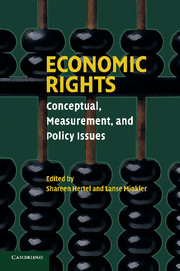1 - Economic Rights: The Terrain
Published online by Cambridge University Press: 18 December 2009
Summary
If morality is centrally concerned with harm and the intent to prevent or minimize harm, then world poverty is the great moral issue of our time. Yet with all of the attention on security and political freedoms it would not seem that way. Consider some telling comparisons. From 1998 to 2005, terrorism killed twenty thousand people globally (UNDP 2005, 151). In contrast, in one year (2001), twenty-two million people died preventable deaths due to deprivation – that is, from poverty (Commission on Human Security 2003, 6). In that same year, almost 1.1 billion people lived on a dollar-a-day or less, and over 2.7 billion (i.e., slightly under half of the earth's population) lived on $2 a day or less (Chen & Ravallion 2004). Despite this evidence of unfathomable suffering experienced by much of the world's population, military security and political freedoms capture the most attention. Moreover, despite recent pioneering intellectual work, economic rights remain less well articulated conceptually than civil and political rights, less accurately measured, and less consistently implemented in public policy (Steiner & Alston 1996; Kunnemann 1995). But a different kind of freedom and a new kind of security need to share center stage. For billions of people, freedom from deprivation and the kind of human security arising from that freedom are crucially important. Economic rights are perhaps the best way to secure that freedom, and new scholarship needs to emerge to lead the way.
- Type
- Chapter
- Information
- Economic RightsConceptual, Measurement, and Policy Issues, pp. 1 - 36Publisher: Cambridge University PressPrint publication year: 2007
References
- 8
- Cited by



